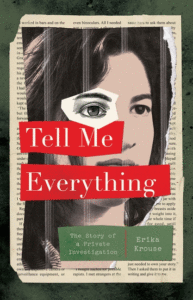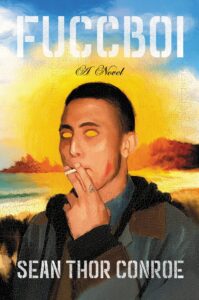
Our feast of fascinating reviews this week includes Molly Young on Elena Ferrante’s In the Margins, Laura Miller on Erica Krause’s Tell Me Everything, Mark Greif on Jennifer Egan’s The Candy House, Cal Revely-Calder on Sean Thor Conroe’s Fuccboi, and Lauren Le Blanc on Susan Straight’s Mecca.
“In this and in other works, Ferrante reminds us what a gift anonymity can be to the reader. How refreshing to access words without fighting through the obscuring fog of a ‘brand’ … For those who wish to burrow gopher-like into the author’s mind, Ferrante has prepared a tunnel … In her theory of writing, Ferrante stands opposed to someone like Joan Didion. Didion famously insisted that she wrote in order to find out what she thought…In Ferrante’s case, the act is a flawed transcription of what she calls ‘the brain wave.’ For Didion, everything was gained in the voyage from mind to pen; for Ferrante, much goes missing. As much as In the Margins, is a philosophical monograph on the nature of writing, it is also a practical manual. Ferrante furnishes tips. She doesn’t present them as such—there’s no prescription, only an outline of what she’s learned and how it’s helped her (and by implication, how it might help anyone else).
–Molly Young on Elena Ferrante’s In the Margins: On the Pleasures of Reading and Writing (The New York Times)

“This is a startlingly fresh book that proves the memoir can do much, much more than just describe, or pretend to describe, what really happened … Is Krouse exaggerating here? Probably, but the persona she’s crafting for herself—a nebbishy yet funny everywoman, a bit klutzy and specializing in self-deprecating wisecracks—is as familiar as her face. She’s Cathy from the comics, Liz Lemon, a character to be played by Beanie Feldstein: relatable, comfortable company who transforms her utter averageness into humor … nothing undermines Krouse’s self-description more than the scenes in which she interviews victims, witnesses, and perpetrators in the campus rape case. These read like a master class in drawing people out, no easy task in a football-worshipping town where the accusers paid a heavy social price for troubling the home team … figuring out Krouse is the most fascinating puzzle in the book. She is an unreliable narrator, but not about the facts—about herself. At the beginning of Tell Me Everything, the reader has to peer beneath Krouse’s self-portrait of a hapless nonentity to see the tough, canny survivor she actually is. How does a person end up so blind to her own nature? And how did she become such a savant at reading people in the first place? As she works on this enraging case, with victims whose experiences often mirror her own, Krouse inches her way toward a better understanding of who she is. Tell Me Everything isn’t a testimony of suffering. It’s the evidence of what Krouse has made from it: an artist, and a formidable one.
–Laura Miller on Erica Krause’s Tell Me Everything: The Story of a Private Investigation (Slate)
“Gone are the poignant emotional swerves and empathy for sad sacks elicited by The Goon Squad. A journey that had seemed bittersweet, plaintive, familiar yet refreshed by Egan’s singularly convoluted narrative construction—like jazz standards burnished with brilliant arrangements—now sounds depthlessly manic, like sped-up Muzak. It’s as though Egan’s ingenious technique has been streamlined for short attention spans … The Candy House knows the techniques of The Goon Squad, but doesn’t recognize the limits of their strengths … The Candy House goes all in on the celebrity fantasia and undermines the ordinariness … In a novel where almost everyone’s luck has turned good, Egan’s reach for the heartstrings loses its plucking power. To compensate, she introduces satirical diversions that explore technology’s challenge to fiction … You cannot proclaim the novel a winner, in a cardboard contest between tech and tales, while whirring along yourself on stock elements and toothless satires of bad movies. At her best, Egan has been the inventor of algorithms of rich complexity, stimulating core human yearnings through technical devices. Trying them again, but this time to evoke a triumphal register of emotions, she has proved the pertinence of Silicon Valley gospel to her fiction: To keep her audience spellbound, sitting still won’t work. She’ll have to innovate.”
–Mark Greif on Jennifer Egan’s The Candy House (The Atlantic)

“Fuccboi, then, may represent the last fumes of alt-lit as a genre: its clubbish stylistic tics, its hatred of ‘mainstream’ writing, its contempt for the novel as a form. Fiction is a medium, not an intercom; it is in its nature to complicate, tease, obscure. But when Scott McClanahan, one of Conroe’s peers, says Fuccboi ‘sounds like no one I know,’ it’s not because Conroe is ‘utterly original’ but because the rage of his book seems rote. Self-involvement, in the end, tends toward sterility: No good politics can develop from dealing only with yourself. Fuccboi mistakes narcissism for introspection, as so many alt-lit failures have before. Long before this novel is over, it’s reached a stylistic and moral dead end.”
–Cal Revely-Calder on Sean Thor Conroe’s Fuccboi (The Nation)
“The act of listening and the powerful precision of language surface again and again in Mecca … Straight laces her stories with language in Mixtec and Spanish without translation for the monolingual English-speaking readers. While this may frustrate some, the sensation of mystery and the need to read around the dialogue for clues and tone placed me in the mind of those who are forced to submit to English at all times … Straight never shies away from large themes and historical significance across varied time periods … Here, as in all her books, she elevates the lives of extraordinary everyday people whose lives speak to a universal fragility and pride … At many moments, the book’s cumulative impact made it necessary to set the book aside to collect myself before continuing. Without question, I’d pick it up again. Taking Johnny’s dictum to listen and wait to heart, one can and should pause to let the novel’s tremendous scope settle.”
-Lauren Le Blanc on Susan Straight’s Mecca (The Boston Globe)

